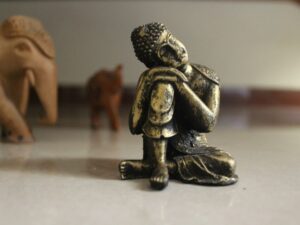
At a Group Relations Conference two years back, the Primary Task was: to study the exercise of authority in the taking up of roles through the interpersonal, inter-group, and institutional relations that develop within the conference as an organisation, within its wider context.
During this conference, the identities I was recognized by were ‘woman’, ‘middle aged’, and ‘brown’. What struck me is that these labels are given as a limiting force by the system. I agree that I am brown and I am middle-aged – but that defines ‘what is’; it does not limit me.
Here is my experience regarding two separate incidents at this conference, in the space of these identities:
Incident 1:
In the Large study group where the entire group met, the seating arrangement was that of two spirals in double-coil format. For a few days, men took the centre of the spiral. Nothing moved forward in the group, we were neither exploring nor discussing, and there was this feeling of being stuck. With some planning, one fine day, we women took over the centre of the spiral.
As we were sitting in the centre and enjoying what we have achieved, the group started slowly waking up to the reality of what happened. A new reality. Some were congratulating us, some were seeing us in a new light; there was some recognition and appreciation. The earlier occupants were stunned and were lamenting how the middle-aged women took over their seats and that they were feeling emasculated. There was also a discussion on how all the women sitting in the centre were middle-aged, and the young women were left out.
At that moment, one voice from the further end of the spiral asked
“Are you planning to do anything? I understand you took over the space but what are you going to do now?”
She was young and I could sense disappointment. When men occupied the centre-stage, nothing more was expected, but with women occupying it, something more was demanded. That too from other women. There was disappointment for not achieving more and ambivalence towards the formation of alliances with the older women.
The ‘middle-aged women’- I wonder what we represented – the mothers they resented? Shame if we were not cool enough or effective enough? Is it envy or competition? Also, in patriarchal systems, men use women as gate-keepers to keep the outliers inline – no one should stray, no one can reach forward, no moonshots.
Incident 2:
In a separate inter-group event, my colleague and I went to the group that called themselves a diversity group. As I started speaking, they were looking at my colleague and responding to her. It was almost like I was not there. Later, I went to the same group requesting them for a meeting. I shared the need for the meeting, our request, the task, venue and time. But when we met them, they asked basic questions as if I had not shared all the information earlier. It was puzzling. My colleague and I explored this with the members from the diversity group.
The three women from the diversity group accepted that they were not able to see me in a leadership position, as I was brown. They were able to respond to my colleague who was Caucasian and were not able to acknowledge what I was saying. Interestingly, two in that group were from the UK, the colonizer, and I am from India, the colonized. Later, one of them apologized profusely.
Reminiscence
When we are in a group it is not about the self, it is about what’s happening in the group, the organization, or institution. Where is the intersecting point? When you can’t see me or hear me, where will we meet to know each other? There is an unconscious and immediate negation of mutual recognition. That was the question that haunted me.
Moreover, I had a choice in whether I wanted to feel limited, labeled, judged or cheated. But in many ways, these identities are part of what I am. I felt proud and centred as I embraced them. Also, what I am today does not stop the million possibilities of what I can become in the future – and it is into this beautiful future that I walk forward and
Published on October, 2021 on NIODA Blog




